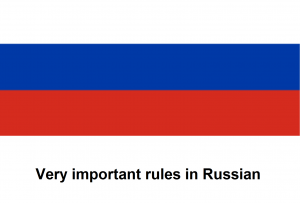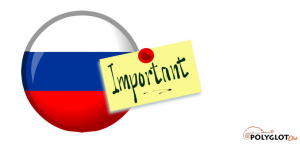Difference between revisions of "Language/Russian/Grammar/Very-important-rules"
About Blank (talk | contribs) |
|||
| Line 22: | Line 22: | ||
In addition, the place of the accent may change as the word changes shape, here are some examples: | In addition, the place of the accent may change as the word changes shape, here are some examples: | ||
*the hand: | *the hand: рука́ (singular) - ру́ки (plural) | ||
*leg: | *the leg: нога́ (singular) - но́ги (plural) | ||
In other cases, a change of place of the accent may change the meaning of the word. | In other cases, a change of place of the accent may change the meaning of the word. | ||
For example: | For example: | ||
* | *мука́ (flour) ≠ му́ка (torment, torture) | ||
* | *замо́к (the lock) ≠ за́мок (the castle) | ||
* | *уже́ (already) ≠ у́же (narrower) | ||
==Capital letters (Заглавные буквы)== | ==Capital letters (Заглавные буквы)== | ||
Russians do not put capital letters: | Russians do not put capital letters: | ||
Revision as of 23:21, 2 October 2021
.
.
Hello everybody,
In this lesson for beginners, we will study some Russian grammar rules as well as structures of special importance.
By studying them carefully, you will avoid many mistakes, especially when writing about the future.
Feel free to edit this page by adding new words and expressions!
Good learning! :)
.
Accentuation (Ударение)
In Russian, there are no rules governing the position of the tonic accent.
That you learn Russian words, you must learn at the same time the accent of each one.
In addition, the place of the accent may change as the word changes shape, here are some examples:
- the hand: рука́ (singular) - ру́ки (plural)
- the leg: нога́ (singular) - но́ги (plural)
In other cases, a change of place of the accent may change the meaning of the word.
For example:
- мука́ (flour) ≠ му́ка (torment, torture)
- замо́к (the lock) ≠ за́мок (the castle)
- уже́ (already) ≠ у́же (narrower)
Capital letters (Заглавные буквы)
Russians do not put capital letters:
to the names of days of the week and month:
- а́вгуст (August),
- вторник (Tuesday).
to words derived from proper names:
- Москва́ -> моско́вский (from Moscow, Muscovite),
- Россия -> российский (Russian, Russian).
to the words designating nationality:
- итальянец (Italian, an Italian),
- америка́нец(American, an American),
- францу́женка (The Frenchwoman, a Frenchwoman).
titles and words to address people:
- господин (Sir),
- профессор (Professor).
The only two cases where you have to use a capital letter are:
if it's the beginning of a sentence:
- "Была зима" - It was winter.
if it's a proper name:
- Дми́трий,
- Санкт-Петербу́рг.
Spelling: vowels Я, Ю, Ы and О
(Правописание: гласные Я, Ю, Ы и О)
There are three very important spelling rules in Russian. Hold them back, and you'll never have a bad time trying to write a lot of Russian words correctly.
Never write the vowels Я and Ю after the consonants Г, К, Х, Ш, Ж, Щ, Ч and Ц.
Я must be replaced by А, and Ю replaced by У.
Examples (примеры):
- чашка - the cup
- шагать - walking
- птица - the bird
- восхищаться - to admire
Exceptions (исключения):
- парашют - the parachute
- брошюра - booklet, pamphlet, brochure
After the consonants Г, К, Х, Ш, Ж, Щ, Ч (but not Ц) we never use the vowel Ы, which must be replaced by И.
- широкий - large, wide
- хороший - good
- жизнь - life
After the consonants Ш, Ж, Щ, Ч and Ц, the vowel О is replaced by Е when it is not accented.
- accented: жучок - small beetle (diminutive form)
- not emphasized: внучек - grandson (diminutive form)

